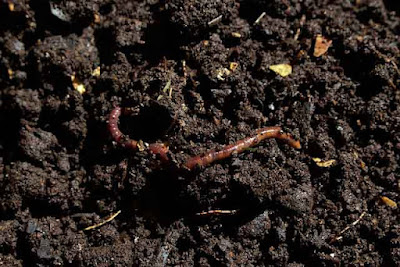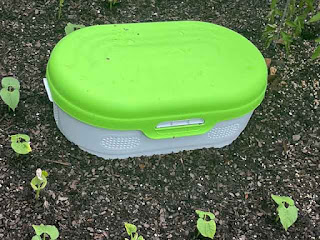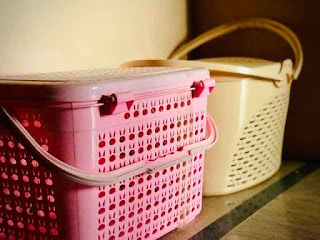First of all, what is worm composting? I'm glad you asked. It’s the practice of intentionally enlisting the aid of earthworms in composting your organic yard and kitchen waste to use in your garden.
If you have an open compost pile or bin in your garden, earthworms have likely found their way to it.
As I wrote in “The Not-So-Magical-Experience of Composting”, the compost pile is “like a big bash going on down the street, nearby residents and passersby take notice. Flies breeze by and drop off bacteria. Single-cell creeps with hardly half a brain between them arrive and begin to cling. Fun-guys (fungi) appear from nowhere and make themselves at home. Mites pick at this and that, including other guests. Millipedes stroll and stroll and stroll, sampling a bit of everything. Sowbugs eat stuff mashed on the floor. Snails and slugs, never socially adept, slime their way among the crowd munching left-overs. Spiders entrap and roll the unsuspecting. Centipedes and beetles knock over spiders and other party-goers. Earthworms work their way around, and somehow everything comes out right from their ends."
I never gave earthworms much thought. They just showed up, and I expected that they always would.
This year I bought a couple of Vego 17" Tall 9 In 1 Modular Metal Raised Garden Bed Kits. With them came a promotional gift package containing two of their In-Ground Worm Composters.
I installed one in an unplanted garden bed. At once, I began adding some soil and kitchen scraps to the bin. That’s how it started.
One can’t have a worm composter without worms. Being the impatient fellow that I am, I bought a bag containing 500 red wigglers from Uncle Jim’s Worm Farm. They arrived safely and earlier than expected. They are now happily housed in their new digs. (I guess they’re happy. They’re not actually smiling like Uncle Jim’s website shows. But who can tell with worms?) Now I divide our fruit and vegetable kitchen scraps between my worm composter, compost barrel and “swamp water” composter. (The “swamp water” composter is another story.)
In short order, I expect the worms to do their job decomposing the scraps. The compost should feed the garden bed, and the worms might wander around improving the soil.
So far, I recommend the Vego In-Ground Worm Composter. It’s a simple contraption compared to some others I’ve seen on the market. But I started thinking that there must be an even cheaper way.
It seems to me that one could use a simple plastic laundry basket with a lid, remove handles, partially sink it in the ground, then add soil, scraps and worms. The lid, I believe, would be essential to keep neighborhood cats and raccoons out. It might not even keep the raccoons out unless the lid was secured somehow.
I’ll try it myself when I need another worm composter, but if you try it before I do, let me know how it works for you.
By the way! Vego Garden and Uncle Jim’s Worm Farm do not know I’m posting this article. They certainly haven’t paid me for this mention, nor do I expect them to. Rest assured that this is entirely honest and unsolicited.
Return to GoGardenNow.com.









No comments:
Post a Comment